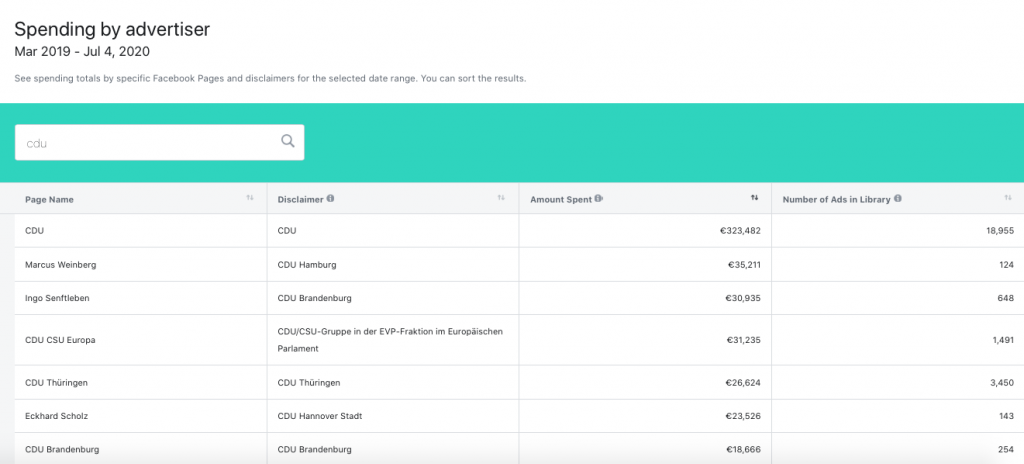How can you access data?
1. Public account data
Facebook makes post-data from public groups and pages available to researchers and CSOs via CrowdTangle or selectively via the Facebook API. The process of gaining timely data access for research is not clear, although Facebook announced criteria and steps would be announced in early 2019. For now, we recommend getting in touch with real humans at Facebook within your own country. In our experience, this process can take plus or minus 3 months.
2. Political ad data
Facebook provides data related to political/issue Ads in a limited number of counties via:
- Ad Library: no programming, simple search
- Ad Library Report: no programming, simple search
- Ad Library API: programming needed, more advanced search
Unlike CrowdTangle, these resources are available to anyone (in a limited number of countries). No programming is needed to use the Ad Library or Ad Library Report, but the data available is simpler. Programming is needed for the Ad Library API, but you will be able to perform more advanced searches. To access the Ad Library API, you will need to: (a) confirm your identity (b) create a developer account and (c) add a new app.
As of July 2020, these resources are available in the following countries:

| Ad Transparency Tool | Country Available |
| Facebook Ad Library | American Samoa, Argentina, Austria, Belgium, Brazil, Bulgaria, Canada, Croatia, Cyprus, Czech Republic, Denmark, Estonia, Finland, France, French Guiana, Germany, Greece, Guadeloupe, Guam, Hungary, India, Ireland, Italy, Latvia, Lithuania, Luxembourg, Malta, Martinique, Mayotte, Netherlands, Northern Mariana Islands, Poland, Portugal, Puerto Rico, Reunion, Romania, Saint Barthelemy, Saint Martin, Saint Pierre and Miquelon, Singapore, Slovakia, Slovenia, Spain, Sweden, Ukraine, United Kingdom, United States, United States Minor Outlying Islands, US Virgin Islands |
| Facebook Ad Library Report | Argentina. Austria, Belgium, Bulgaria, Canada, Croatia, Cyprus, Czech Republic, Denmark, Estonia, Finland, France, Germany, Greece, Hungary, India, Ireland, Israel, Italy, Latvia, Lithuania, Luxembourg, Malta, Netherlands, Poland, Portugal, Romania, Singapore, Slovakia, Slovenia, Spain, Sri Lanka, Sweden, Taiwan, Ukraine, United Kingdom, United States |
What data is available?
1. CrowdTangle
Through CrowdTangle, you gain access to public Facebook pages and groups. This does not include posts or comments from private users or deleted posts (e.g. deleted disinformation). Through CrowdTangle you have bird’s eye view across many public pages and groups and will need to filter through a sea of information
First, you can search for a collection of posts by account names or keywords across posts by public groups and pages. Based on this search, you get an abundance of data for each post. See CrowdTangle’s codebook for more information and additional metrics available. Here are some of the metrics that you will data:
| Account Name | User Name | Number of Followers |
| Data Created | Type (i.e. photo or video) | URL |
| Link (in post) | Photo | Title |
| Description (text of post) | Number of interaction (i.e. reactions, comments, shares, video views) | Overperformance Score (i.e. indicator of virality - how much worse or better a post is doing relative to the page after 1 hour) |
2. Facebook Ad Library, Ad Library Report and Ad Library API
Through the Facebook Ad Library you can search for political ads by keyword or advertiser and filter further based on platform, date ranges and location, potential reach and disclaimer. You are able to see the actual advertisement, expenditure, and reach (impressions, gender of user).

If you are more interested in downloading spreadsheets instead of seeing actual ads, you should try Facebook's Ad Library Report. You can search by keyword or advertiser and get information on their total advertising expenditure and number of ads within a given time period. Note that you cannot select the time period becuase Facebook has pre-selects buckets, which might cause problems when matching data directly to candidate's financial reports.

If you have programming skills, you might want to try Facebook's Ad Library API because you will have more advanced search options.
Additional Resources
If you have issues gaining access to CrowdTangle, there are a number of paid alternatives, which might be expensive for small CSOs trying to monitor social media.
- Buzzumo
- NewsWhip
- TalkWalker
- Sysmos
- BrandWatch
- Visibrain
- CrowdTangle's free plug-in is a great complementary tool to see how content moves across social media platforms